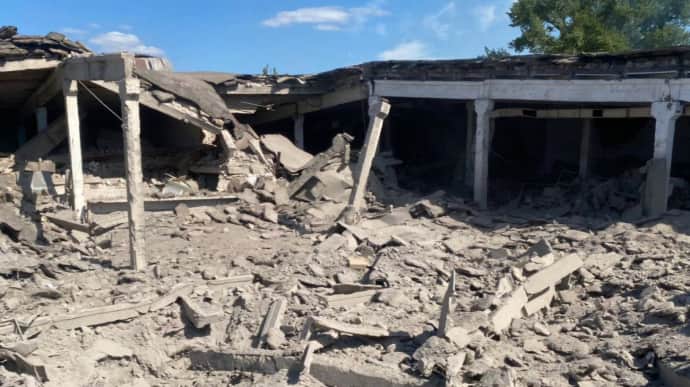Daily Flyer - June 21, 2024
A voice of Ukraine to the West

Russian forces attack infrastructure in Kryvyi Rih

Russian forces launched an attack on the city of Kryvyi Rih in Ukraine's Dnipropetrovsk Oblast on the afternoon of June 21, targeting key infrastructure and igniting a significant fire.
The strike occurred amidst heightened tensions and ongoing conflict, causing alarm among residents. Serhii Lysak, Head of the Dnipropetrovsk Oblast Military Administration, announced the incident on Telegram, stating, "The enemy has attacked Kryvyi Rih. The city's infrastructure has been targeted. A fire has broken out. Information is being gathered."
Earlier in the day, the Ukrainian public broadcaster Suspilne reported a series of explosions rocking Kryvyi Rih. Concurrently, Ukraine's Air Force had issued a warning about a high-speed target approaching the city, which likely preceded the attack.
As emergency responders worked to control the fire and assess the damage, the situation underscored the ongoing threat to Ukrainian cities from Russian forces. The attack on Kryvyi Rih is a stark reminder of the conflict's reach and the continuous danger faced by civilians and infrastructure in the region.
Ukrainian defenders foil Russian plans near Borova, Kharkiv Oblast
In the northern reaches of Kharkiv Oblast, the Ukrainian defenders have shown remarkable resilience and strategic prowess. The small settlement of Borova, once a peaceful village, had become a focal point in the larger conflict between Ukraine and Russia. On the afternoon of June 21, as the sun dipped towards the horizon, the Ukrainian forces stood firm against an aggressive push by Russian troops.
Andrii Yusov, a representative of Defense Intelligence of Ukraine (DIU), recounted the intense battle during a national newscast. "The enemy had their sights set on Borova," Yusov explained. "But our defenders were ready. They have thwarted the enemy's intentions there, dealing significant losses in both personnel and equipment."
The Russian offensive had been meticulously planned. Thousands of troops and a formidable array of military equipment were mobilized to break through Ukrainian lines and capture Borova. The Russian forces expected a swift victory, but the Ukrainian defenders had different plans.
As the Russian forces advanced, the Ukrainians launched a series of strategic counterattacks. The battlefield was soon littered with the remnants of Russian tanks and vehicles, their advance stymied by the well-coordinated efforts of the Ukrainian soldiers. Despite their initial confidence, the Russian troops found themselves in a dire situation, their numbers dwindling and their equipment failing under the relentless pressure of the Ukrainian defense.
"The Russians are trying to pull up reserves," Yusov said, "but they face significant challenges. There's currently no indication they can assemble new forces to replicate their previous attempts." He emphasized that while the potential threat remains, the Ukrainian defenders have managed to disrupt and demoralize the Russian forces effectively.
The victory at Borova was not just a military success; it was a strategic triumph. By forcing the Russians to redeploy their reserves from other critical areas, the Ukrainian forces highlighted the vulnerability and logistical strains on their adversaries. This disruption extended beyond the immediate battlefield, indicating that the situation for the Russian forces was not going according to their plan.
Yet, Yusov cautioned that the broader conflict was far from over. "The situation on Ukraine's northern border remains tense and dangerous," he warned. "The enemy will continue to try to stretch our reserves and distract us from the critical battles in the east."
As night fell over Borova, the Ukrainian defenders remained vigilant, knowing that their hard-fought victory was just one battle in a long and arduous war. Their success against the Russian forces stood as a testament to their determination and strategic acumen, offering a glimmer of hope amid the ongoing conflict.
US explains why it decided to prioritise supplying Ukraine with air defence missiles
On June 20, US State Department spokesperson Matthew Miller elaborated on Washington's strategic decision to prioritize the supply of interceptor missiles for air defense systems like the Patriot to Ukraine. Speaking at a briefing, Miller highlighted the critical need for enhanced air defense capabilities in Ukraine, particularly in light of Russia's ongoing military aggression.
Miller explained that the decision followed a thorough assessment of Ukraine's arms needs and involved direct discussions with the Ukrainian government. He emphasized that the pattern of Russian attacks, which have increasingly targeted Ukrainian cities and energy infrastructure, underscored the urgency of bolstering Ukraine's air defenses.
"We’ve seen the Russian military targeting Ukrainian cities. We’ve seen them targeting energy infrastructure, making clear that they want to turn the lights off and turn the heat off when winter rolls back around," Miller said. "It has been clear to us that we needed to do something to increase Ukraine’s air defense capabilities."
The US has committed to sending additional air defense systems and interceptor missiles from various sources worldwide to support Ukraine. This includes re-sequencing deliveries of Patriot interceptors—missiles designed to intercept and destroy incoming threats— to address the pressing needs Ukraine faces amidst the intense Russian air bombardment.
Miller stated, "So that’s the decision that the President took, which is to re-sequence some of the deliveries of Patriot interceptors – the missiles that go up and intercept missiles that have been fired by Russia – to re-sequence them from other countries, because of the dire need that Ukraine has and the dire threat that Ukraine faces, to make sure that Ukraine is getting what it needs now to defend itself from this intense Russian air bombardment."
The move reflects Washington's commitment to ensuring that Ukraine can protect its infrastructure and civilian population against continued Russian aggression, especially as winter approaches.
US Senate wants to recognise Russia as sponsor of terrorism following Putin's pact with Kim Jong Un
On June 20, Senators Lindsey Graham and Richard Blumenthal introduced a bipartisan bill to designate Russia as a state sponsor of terrorism. This move came after Russian President Vladimir Putin's recent strategic partnership with North Korean leader Kim Jong Un, as well as Russia's ongoing aggressive actions, particularly the invasion of Ukraine.
At a press conference, Senator Graham spoke about the urgency of this designation. He pointed to Russia's numerous crimes and the new defense agreement with North Korea. Graham highlighted the necessity of recognizing Putin's regime as a state sponsor of terrorism in light of these developments.
Senator Blumenthal shared similar concerns, describing the Putin-Kim agreement as "deeply frightening and hostile." He emphasized the brutal killing of thousands of civilians in Ukraine as one of the many reasons for this designation.
The senators outlined Russia's history of terrorist activities, including the poisoning of Ukrainian candidate Viktor Yushchenko in 2004, the poisoning of Alexander Litvinenko in 2006, the downing of Malaysia Airlines Flight 17 in 2014, the bombing of Aleppo in 2016, the poisoning of Sergei Skripal in 2018, and the death of opposition leader Alexei Navalny in 2024.
The bill has garnered significant bipartisan support in Congress and is being discussed with the presidential administration. Graham stressed that recognizing Russia as a state sponsor of terrorism is a necessary response to its continued acts of aggression and partnership with oppressive regimes.
4o

